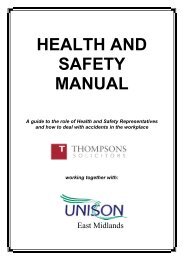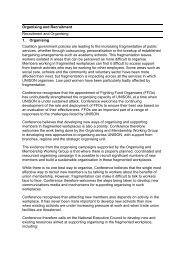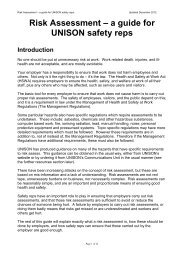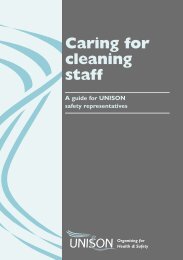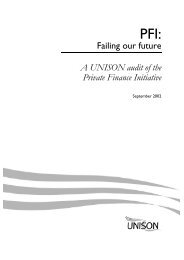TRANSGENDER WORKERS RIGHTS - Unison
TRANSGENDER WORKERS RIGHTS - Unison
TRANSGENDER WORKERS RIGHTS - Unison
You also want an ePaper? Increase the reach of your titles
YUMPU automatically turns print PDFs into web optimized ePapers that Google loves.
T r a n s g e n d e r w o r k e r s r i g h t s – A p r i l 2 0 1 2<br />
Employers must take positive steps to support and protect all workers from<br />
harassment by co-workers, service users and members of the public. This<br />
should include well publicised policies, monitored to check their effectiveness,<br />
and training of managers and all staff. Branches should ensure the harassment<br />
policy includes specific reference to gender identity and gender reassignment.<br />
Indirect Discrimination<br />
Because transgender people could not change their legal sex until 2005,<br />
heterosexual transgender people were unable to marry, as their partner was the<br />
same legal sex. This led to indirect discrimination in gender-related benefits,<br />
such as passing on pension rights and insurance policies to partners or children.<br />
It is now possible to gain legal gender recognition. It is also possible to form a<br />
civil partnership with a person of the same sex, giving the same workplace<br />
benefits as marriage. However, not all trans people can apply for legal gender<br />
recognition.<br />
Branches should make sure that transgender workers are treated as the gender<br />
in which they live, irrespective of legal sex. Transgender workers should have<br />
equal rights and equal access to benefits, including equal recognition of their<br />
partner and family.<br />
All contracts and agreements should be checked for possible discrimination.<br />
Occupational requirements<br />
In the vast majority of cases, the gender of a worker is of no relevance to their<br />
ability to do a particular job. However, the Equality Act 2010 does allow for an<br />
exception where being of a particular sex is an ‘occupational requirement’ of that<br />
post. It might apply where the work necessarily involves conducting intimate<br />
searches, or where services are provided to one gender only, such as a women’s<br />
refuge.<br />
The Equality Act makes it clear that the employer must act reasonably in applying<br />
an occupational requirement. For example, conducting intimate searches is<br />
unlikely to be a main part of any particular post. The employer must consider<br />
whether these tasks could be carried out by someone else. Also, the<br />
occupational requirement must be identified at the beginning of the recruitment<br />
process and stated in the application pack.<br />
If a member who is intending to transition permanently works in a single sex<br />
position or organisation, it is probably best for the member, the employer and<br />
any service users if redeployment can be negotiated. Branches should make sure<br />
that options are discussed early on, to reach the best outcome.<br />
Don’t forget that a person with a Gender Recognition Certificate is legally of<br />
that sex for all purposes.<br />
Working for LGBT equality in UNISON: out@unison.co.uk 5



